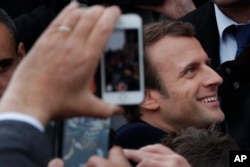The United States informed French officials that Russia had hacked France's computer networks during the country's presidential election before the cyberattacks became public, the National Security Agency chief told Congress on Thursday.
"We are aware of specific Russian activity directed against the French election cycle, in the course, particularly in the last few weeks," Admiral Mike Rogers testified before the Senate Intelligence Committee. "We think it was important enough that we actually reached out to our French counterparts to inform them."
France's election campaign commission said Saturday that "a significant amount of data," some of it likely fake, had been leaked on social networks after a cyberattack on the presidential campaign of centrist candidate Emmanuel Macron.
The leak came 36 hours before France's runoff election Sunday in which Macron beat far-right candidate Marine Le Pen.
French election officials said the leaked data apparently came from the computer systems and email accounts of Macron and some of his campaign managers.
Before the Senate Armed Services Committee on Tuesday, Rogers compared the cyberattacks on Macron's campaign to those in the U.S. on the Democratic National Committee and a close aide to Democratic presidential candidate Hillary Clinton before the November presidential election that was won by Donald Trump.
Evidence points to Russia
U.S. intelligence agencies have concluded the evidence indicates Russia was responsible for the hacks.
Rogers also has said that there has been no reduction in the volume of attempted Russian cyberattacks and that the U.S. needs to take tough action against nations that attempt to undermine American democracy.
To do so, Rogers said, the U.S. must continue to develop a comprehensive cyberpolicy and improve its ability to defend itself in the cyberdomain.
Later Thursday, Trump signed an executive order aimed at bolstering the federal government's cybersecurity and protecting the nation's infrastructure from cyberattacks.
Speaking to reporters at the White House, Trump's homeland security adviser, Tom Bossert said global cyberattacks on the U.S. were increasing. "The trend line is going in the wrong direction," he said.
Bossert said the executive order was not motivated by Russia, but partially by the need to develop and implement a deterrence strategy — something he said President Barack Obama's administration "had an obligation to do."
Russia continues to deny allegations it is responsible for cyberattacks with the intent to interfere in foreign elections.






